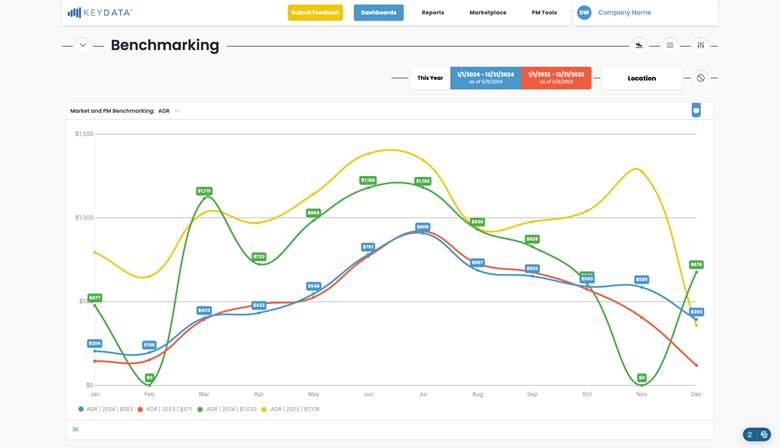How to Maximize Short-Term Rental Revenue with Accurate Market Data
Melanie Brown
8/4/2025
Sponsored by Key Data
The short-term rental industry has evolved far beyond simply managing properties in desirable locations. Today’s most successful property managers understand that sustainable revenue growth comes from making informed, data-driven decisions that respond to constantly shifting market conditions.
When occupancy rates fluctuate and competition intensifies, gut instincts and past experiences alone won’t cut it. Property managers who consistently outperform their competition rely on real-time market intelligence to guide their pricing, marketing, and operational strategies.
Why Data Matters More Than Ever
The short-term rental landscape changes rapidly. Guest preferences shift, new competitors enter the market, and economic conditions influence travel patterns. Property managers who wait to react to these changes often find themselves playing catch-up, missing opportunities to maximize revenue during peak periods or failing to adjust quickly enough during downturns.
Accurate market data provides the foundation for proactive decision-making. Instead of wondering whether your rates are competitive or whether your occupancy is on track, you can benchmark your performance against local market conditions and identify opportunities before your competitors do.
Three Critical Areas Where Data Drives Revenue
1. Strategic Pricing Based on Real Market Conditions
Consider what happened across US markets this summer. While national occupancy rates dropped 5% year-over-year, the story varied dramatically by location. San Diego experienced an 11% decline in occupancy but maintained higher daily rates, indicating an opportunity for property managers to prioritize rate optimization over-occupancy at any cost.
Meanwhile, Orlando experienced 5% occupancy growth year-over-year with lower daily rates, suggesting room for strategic rate increases. These market-specific insights reveal opportunities that become invisible when you consider only your own property’s performance in isolation.
The key is accessing data that reflects actual booking behavior rather than listing prices. Aggregated booking data from property management systems provides a more accurate picture of what guests are actually paying, not just what properties are asking.
2. Performance Benchmarking That Reveals Hidden Opportunities
Understanding whether your property is overperforming or underperforming requires context. A 70% occupancy rate may seem strong in one market, but it could indicate missed opportunities in another.
Effective benchmarking involves comparing your key metrics, including occupancy rate, average daily rate (ADR), and revenue per available rental (RevPAR) against similar properties in your market. This comparison reveals specific areas for improvement and helps validate successful strategies.

3. Forward-Looking Market Analysis for Strategic Planning
Smart property managers don’t just react to current conditions; they anticipate future trends. Market data can reveal emerging patterns in guest behavior, booking windows, and seasonal demand that inform long-term strategy.
For instance, understanding how domestic versus international travel patterns are shifting in your market helps you adjust marketing spend and target the right guest segments. Similarly, tracking changes in length-of-stay preferences can inform minimum stay requirements and pricing strategies.
Economic uncertainty makes this forward-looking approach even more critical. Properties that recognized early shifts in booking patterns during recent economic volatility were able to adjust their strategies proactively rather than reactively.
Implementing a Data-Driven Approach
Successfully leveraging market data requires the right tools and processes. Look for platforms that integrate seamlessly with your property management system and track the key metrics that matter most to your business, including occupancy, ADR, RevPAR, booking window, and length of stay.
The goal isn’t to collect data for its own sake but to create actionable insights that inform specific decisions. Utilize market intelligence to establish realistic revenue targets, refine pricing strategies, and pinpoint your most profitable guest segments and feeder markets.
Regular reporting to property owners becomes more compelling when backed by market data. Instead of simply reporting their property’s performance, you can provide context about market conditions and explain how your strategies are performing relative to local competition.

Building Long-Term Success
The most successful short-term rental operators view data not as a one-time solution but as an ongoing competitive advantage. They continuously monitor market conditions, test new strategies based on emerging trends, and adjust their approach based on performance data.
This commitment to data-driven decision-making creates a compound effect. Better pricing decisions lead to improved revenue. Enhanced performance benchmarking reveals new opportunities for optimization. Forward-looking market analysis enables proactive strategy adjustments that maintain competitive advantages.
In an industry where success depends on staying ahead of rapidly changing conditions, accurate market data isn’t just helpful, it’s essential. Property managers who adopt this approach position themselves not only for short-term gains but also for sustainable, long-term growth in an increasingly competitive market.
Melanie Brown
Melanie Brown is the executive director of data insights for Key Data. She leads Key Data’s data analytics team and is a leading industry voice. She has been featured in publications such as VRMIntel, Skift, Wealth of Geeks, Travel Pulse, Reuters, The Washington Post, and Nerdwallet. She has also appeared on stage at numerous industry events, including VRMA International and VRMIntel’s Data and Revenue Management.